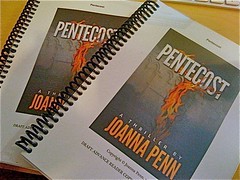
In today’s Publetariat Dispatch, author and publishing consultant Joanna Penn discusses the process of going from rough draft to polished manuscript.
After some major rewrites based on my Editorial Review from the Steve Parolini, the Novel Doctor, I gave my thriller novel ‘Pentecost’ to seven beta readers and asked for their feedback.
This is one of my honest, personal posts! I hope it helps you on your writing journey.
Who are beta readers anyway?
 Review copies printed locally for beta readers
Review copies printed locally for beta readers
Beta readers read your book prior to it going to the printer. You could also use them before submission to an agent or publisher. They read the manuscript for comment on the structure, characters, plot as well as grammar/spelling or anything else they notice that may need revision.Their comments will generally result in another rewrite although of course you don’t need to action everything. Beta readers should be people who like the genre you write in, and also need to be able to give honest feedback. There is no point in just hearing praise at this stage. Criticism only makes our work better!
The practicalities of working with beta readers
I selected five of my friends who read in similar genres as me i.e. fans of thrillers, crime, mystery and fast paced novels. I also asked a writer friend I respect, the lovely Alan Baxter and also my copy editor (who just happens to be my Mum – lucky me!)
I gave them a hard copy A5 version of the book I had printed locally (above) so it was easier to review and make comments on. I also included a letter indicating the comments required i.e. grammar and spelling would be done by my copy editor but I wanted feedback on character, plot, any parts they skipped over or found jarring as well as general comparative notes on other books vs mine.They had three weeks to read it and provide feedback.
I received feedback in the form of marked up A5 books, an interview style discussion and brainstorming as well as phone calls, during which I took copious notes with page references. The most heavily marked up version was from my copy-editor (to be expected).
For the next step, I took my own hard copy of the novel and added comments and notes from all the beta readers. Blue writing is for word changes, tense issues and grammar. Red is for more rewriting needed. Finally, I went through another full rewrite fixing everything from that master draft.
Feedback and lessons learned
 Hard copy with edits
Hard copy with edits
I had a few depressed days as I considered the extent of the feedback! I had thought I was 95% complete but it was actually more like 85%. Going through another full rewrite was not on my schedule and by this stage, I was pretty sick of the manuscript! BUT/ the whole point of the beta reader review and copy edit was to ensure that a quality product is released in Feb 2010.
Some of the good feedback included:
- Great idea for the plot, believable and unsure what was real and what wasn’t
- Fast paced with no time to rest for the reader (this was also given as a criticism but it’s how I like my thrillers to be)
- Good settings, vivid descriptions made it cinematic in scope
- Learned a lot about the Apostles and also Carl Jung which made it interesting
- Good beginning and good ending (with obvious potential for a sequel)
In the spirit of full disclosure and learning for us all, here is some of the constructive criticism received:
- Overuse of particular words e.g. now, just, was, then as well as using the same word in consecutive sentences
- Wrong tense often used
- Dialogue stilted in places
- Point of view moves into third person omniscient when it shouldn’t, especially when settings are described as if from a travel book instead of character’s POV
- Protagonist name change was needed. Morgan Stone as a character came to me when the book was called “Mandala” back in Nov last year. Then the plot morphed to be about the Pentecost stones and her name was too much repetition. I chose Morgan Sierra and rewrote some back story to explain the history of her family so it makes sense.
 Not a page was untouched in the edit
Not a page was untouched in the edit
One of my beta readers also came up with some brilliant additions to the plot which I’m adding in with his consent. It made me think that I need to give the book to readers earlier so I can expand on the plot at an earlier stage.
From this I learned a few very important points:
- I need to study the craft in 2011 so I can fix all the basic stuff myself next time. I’m happy with the story but upset at how much blue is all over the book. Thankfully my copy-editor is brilliant and will go over it again now it has been rewritten so you can expect all this to be fixed in the finished product!
- I understand why editors, agents and publishers hate to read the slush pile. If people don’t use editors, copy-editors and proof-readers before submission, the work could be definitely be improved.
- To all indie and self-publishers, we MUST use editors, copy-editors and proof-readers. Quality in our publishing is especially important as the most annoying criticism of self-publishing is the lack of quality. Yes, it costs money but it definitely improves the finished product!
Have you used beta readers and copy editors? What have you learned from the process?
This is a reprint from Joanna Penn‘s The Creative Penn.